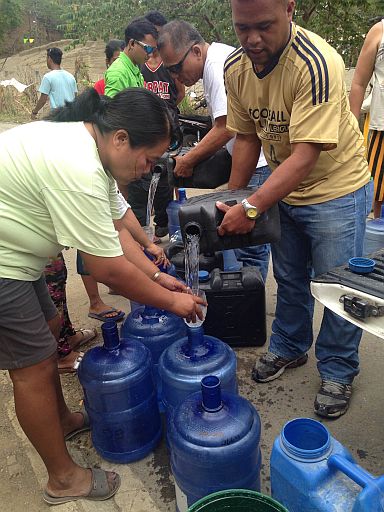Capitol to distribute El Niño relief assistance next week

Residents of Sitio Tac-an queue for potable water distributed by the Cebu City government in Barangay Budlaan. (CDN PHOTO / Julit Jainar)
WITH or without the green light from the Commission on Elections (Comelec), the Cebu provincial government will start next week the distribution of relief assistance to families affected by the El Niño phenomenon.
As this developed, the Department of Agriculture regional office (DA 7) granted the province’s request for cloud-seeding operations to provide relief to farmers whose crops either have withered or were stunted because of the heat.
Baltazar Tribunalo Jr., head of the Provincial Disaster Risk Reduction Office (PDRRMO), said he was informed of the DA’s approval by representatives of the Bureau of Soil and Water Management, with whom he met yesterday.
Tribunalo said they will be coordinating with the DA, state weather bureau Philippine Atmospheric, Geophysical and Astronomical Services Administration (Pagasa) and the Philippine Air Force (PAF).
“If I could have it my way, I’d want them to do it now,” he said. Cloud-seeding operations conducted by Pagasa caused brief moderate to heavy rainfall in parts of Cebu and Talisay cities in the last two days.
The DA-sanctioned cloud-seeding operations will target the Malubog and Buhisan dams as well as at least 1,000 hectares of farmlands in the province.
Pagasa, which has a Doppler radar, will identify seedable clouds while PAF, as approved by Defense Secretary Voltaire Gazmin, will deploy the aircraft that will be used in cloud seeding.
The dry spell induced by the prolonged El Niño phenomenon has caused P196 million worth of damage to crops and livestock and affected around 25,000 farmers in Cebu, which has been put under a state of calamity.
Among the P7 million worth of relief items that the Capitol has prepared for distribution to the affected farmers are assorted seeds, rice, jerry cans, hoses, and plastic containers. The procurement process for these items started last week.
In a letter sent on April 8, Cebu Gov. Hilario Davide III requested Comelec for exemption from the election ban on distributing any form of assistance within the election period.
As of yesterday, there has been no feedback from Comelec. Davide said he would follow up on his request, but also pointed out that he was in the thick of his reelection campaign.
Tribunalo said they would coordinate with the Philippine Red Cross, the organization designated by the Comelec under the Omnibus Election Code, to administer the distribution of any form of assistance during a disaster.
Even the Department of Social Welfare and Development (DSWD) would need Comelec approval to distribute relief assistance that comes from local government units and other government agencies.
“Hindi namin desisyon yun. Comelec ang mag-decide. Kasi sila yung nagdedeklara ng ban (Comelec will decide because they declared the ban),” Social Welfare Secretary Corazon “Dinky” Soliman said in a press conference on Wednesday.
DSWD, however, can distribute relief assistance procured using the agency’s own funds.
“Kaya ang aming aksyon, hindi natin paantayin ang tao na matapos ang eleksyon. Kailangan kumilos tayo (We decided that we should not let the people wait until after the elections. We have to act),” she said.
Soliman said they have distributed P2 billion worth of aid from their Quick Response Fund (QRF) and Climate Change Adaptation and Mitigation Fund as of October 2015. They will continue the distribution until the El Niño ends as projected in June.
Through its municipal and city offices, DSWD has distributed food packs to 186,498 families in Cebu and Bohol provinces.
The beneficiaries in Cebu reached 126,450 families from the towns of Barili, Pinamungajan, Balamban, Asturias, San Remegio, Tabogon, Tabuelan, Madridejos, Daanbantayan, Ronda, Samboan, San Fernando, Minglanilla, Alegria, Alcoy, Ginatilan and Pilar.
A DSWD food pack normally includes six kilos of rice, four cans of sardines, four cans of beef loaf and six packs of coffee.
The top three areas with the most number of beneficiaries are Tabogon with 31,185 families, Cebu City with 16,739 families and Madridejos with 14,060 families.
Kerwin Macopia, information officer of Listahanan under DSWD-7, said distribution of food packs is based on requests made by LGUs which will also identify the beneficiaries.
Disclaimer: The comments uploaded on this site do not necessarily represent or reflect the views of management and owner of Cebudailynews. We reserve the right to exclude comments that we deem to be inconsistent with our editorial standards.
